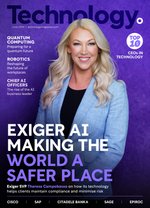Deloitte: Enterprise Gen AI Moving Fast, but Change is Key

As generative AI (Gen AI) burst onto the scene in late 2022, organisations around the world raced to explore the potential of this powerful new technology. Deloitte's newly released State of Generative AI in the Enterprise report for Q1 2024 reveals that the initial novelty phase is rapidly giving way to serious efforts to operationalise and scale Gen AI to drive real business value.
The quarterly report, based on a survey of nearly 2,000 AI leaders across major industries and geographies, provides an in-depth look at the current generative AI landscape and the urgency organisations feel to overcome barriers and capitalise on the technology's immense potential.
“Business leaders are zeroing in on how Gen AI can help them meet their goals for efficiency and cost savings and many are looking into reinvesting savings in innovation and growth use cases — it is clear getting to scale, accurately measuring progress and selecting the right use cases will be critical factors in achieving value generation,” said Costi Perricos, Deloitte Global Office of Generative AI Leader. “Although financial ROI is important, value drivers such as innovation, strategic positioning and competitive differentiation can be even more important."
AI-Savvy Firms Forge Ahead
According to the research, organisations with high levels of Gen AI expertise are leading the charge when it comes to scaling adoption across their operations. A full 73% of highly skilled AI firms report moving quickly to adopt Gen AI tools and systems across business functions.
This group is doubling down by investing heavily in technology infrastructure and providing their workforces with extensive access to Gen AI capabilities. The most advanced firms understand that unlocking maximum value hinges on seamlessly integrating the technology throughout their processes and empowering employees to leverage it.
Building Workforce Capabilities
Notably, nearly three-quarters of all organisations surveyed plan to alter their talent strategies over the next two years to account for the generative AI revolution. Re-skilling, up-skilling and altering work processes top the list of workforce adjustments, reflecting the massive democratising impact Gen AI will have.
No longer will certain tasks be the sole domain of highly-trained subject matter experts and technologists. As generative AI handles more knowledge work, roles across organisations will be augmented and transformed. It's thus critical that firms develop comprehensive strategies to realign roles, redeploy talent, and cultivate the ideal skills to thrive in an AI-powered future.
“As we move from possibilities to practicalities in enterprise Gen AI adoption, scaling up and skilling up go hand in hand – as evidenced by this quarter’s findings. Organisations are hiring new talent and training their workforce, with both technical and human-centred skills remaining valuable to successful deployment,” said Deborshi Dutt, Artificial Intelligence Strategic Growth Offering Lead and Principal at Deloitte Consulting LLP. “To help stay competitive in an ever-evolving market, it is crucial for leaders to foster trust and remain focused on AI fluency when evolving their workforce to meet this moment of transformation.”
Measuring and Building Trust
One of the primary barriers holding some organisations back from aggressive adoption is a lack of trust in generative AI systems' abilities to produce reliable, high-quality outputs in a secure, ethical and equitable manner. Nearly two-thirds of respondents cited trust and risk factors among their top challenges.
Interestingly, while overall trust in AI capabilities has grown in the wake of Gen AI's emergence, fewer than half of respondents currently have rigorous processes in place to cultivate trust and measure user confidence levels. This represents a critical gap organisations will need to close as they scale production deployments.
However, worries around trust and risk are not slowing adoption among Gen AI experts. Organisations with high expertise are paying more attention to transparency with employees and focusing on quality input data, and ensuring reliable outputs.
The Efficiency Advantage
For most organisations, improving workforce productivity and business process efficiency represent the primary motivations for adopting generative AI technologies. Deloitte's research found that while many are realising these benefits to some degree already, the most advanced firms report achieving material efficiency gains and innovation boosts.
Almost three-quarters (70%) of Gen AI experts say the technology has improved their products and services significantly. And nearly two-thirds have experienced a pronounced innovation spark from having human workers collaborate with AI to turbocharge ideation.
Looking ahead, Deloitte's data suggests we're only scratching the surface of Gen AI's potential to reshape industries. Nearly half of firms plan to reinvest any cost savings into pursuing even more ambitious innovation initiatives. And 43% intend to double down on harnessing AI to streamline operations and processes enterprise-wide.
Organisations must act swiftly and decisively to embed Gen AI into their core business fabric. Those that move slowly, the report warns, risk being leapfrogged by more assertive competitors capitalising on AI to disrupt their markets with new business models, products and services.
“Business leaders in the UK are becoming bullish about the potential of Gen AI and we can see this being matched by increasing investment in the technology,” comments Lorraine Barnes, Gen AI lead at Deloitte UK. “Our research shows that most executives expect AI investment in their organisations to increase over the next fiscal year.
“As more companies experiment and implement Gen AI, upskilling the workforce becomes essential. The challenge for organisations, however, will be keeping pace with rapid advances in the technology.
“Many business leaders are also mindful of the risks which Gen AI may present, the biggest being around regulation. Regulations are developing quickly and organisations expect to face a level of uncertainty over their ability to meet them.”
******
Make sure you check out the latest edition of Technology Magazine and also sign up to our global conference series - Tech & AI LIVE 2024
******
Technology Magazine is a BizClik brand
- Deloitte: Delivering Cloud ERP for Higher EducationCloud & Cybersecurity
- Deloitte: Delivering Cloud ERP for Higher EducationCloud & Cybersecurity
- Deloitte Streamlines Atlantic Health System’s Cloud AdoptionCloud & Cybersecurity
- Deloitte Streamlines Atlantic Health System’s Cloud AdoptionCloud & Cybersecurity

